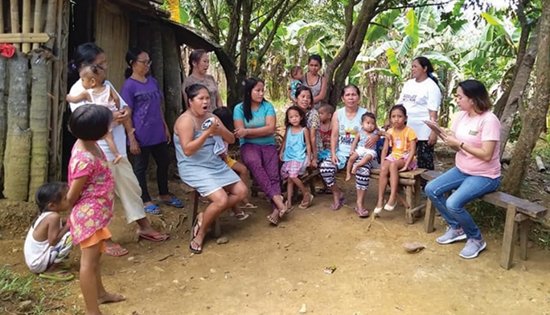|

PNC
Jennibeth S. Canete (right) together with Janice Bael
conduct interview with ECCD F1K beneficiaries during an
R-TAME team monitoring/evaluation of the village of
Buenavista, Baybay City. |
ECCD-IP
implementation in ASAPP areas evaluated
By
JACK C. GADAINGAN,
Nation Builder
June 17, 2019
TACLOBAN CITY – In
three years of its implementation, the Early Childhood Care and
Development - Intervention Package (ECCD-IP) for First 1000 Days
(F1K), has really made some impact in the nutritional status of
local people in the pilot area.
ECCD program coordinator
Jennibeth S. Cañete, who headed the Regional Technical Assistance
Monitoring and Evaluation (R-TAME) team, disclosed this in an
exclusive interview with Nation Builder.
An R-TAME team composed of
Cañete and Janice Bael of National Nutrition Council Region 8
(NNC-8) together with Saloma Guisulga, Elena Monteroso and Melodina
Edullantes of the Visayas State University - Barangay Integrated
Development Approach for Nutrition Improvement (VSU-BIDANI),
conducted a monitoring and evaluation of the ECCD F1K
implementation, down barangay level in the city of Baybay and the
towns of Abuyog, Mahaplag and Hilongos all in Leyte 5th district on
May 28-31, 2019.
“There has been a
significant decrease of malnutrition in this city since the
implementation of the Early Childhood Care and Development!” Baybay
City Mayor Carmen L. Cari claimed in a State of Nutrition Address (SONA)
on October 24, 2018.
The local government units
(LGUs) of Abuyog, Mahaplag, Hilongos and Baybay are covered under
the Accelerated and Sustainable Anti-Poverty Program (ASAPP) of the
national government, a three-year intervention package being piloted
in selected cities and municipalities (10 provinces nationwide)
considered poor.
Health and nutrition is
only one component of ASAPP, which aims to accelerate poverty
reduction and boosting economic growth in the identified localities
through public-private interventions, among which by tapping the
skills and resources of the poor in enabling private enterprises to
expand their production capacities and markets.
Meanwhile, focus on First
1000 Days congruent with the Early Years Act (RA 10410) refers to
full range of health, nutrition, early education, and social
services development program for the holistic needs of young
children. It further narrows down the age-group on First 1000 Days
of life, referred as “golden window of opportunity” for the child’s
growth and development--that includes the time of conception
(pregnancy), until the baby is born and two years of age.
The primary and immediate
objective of ECCD-IP F1K is to reduce maternal and child
undernutrition, specifically at normal times: a. Promote optimum
infant and young child feeding; b. Nutrition services in ante-natal
care; c. Health services (prenatal, prenatal, immunization,
management of childhood illnesses, reproductive health).
In emergencies: d. Vitamin
A, iron, and iodine supplementation; e. Food fortification with
vitamin A, iron, and iodine; f. Diet diversification; Increase food
supply and improve physical and economic access to nutritious and
safe food; and g. Early child learning and psychosocial stimulation.